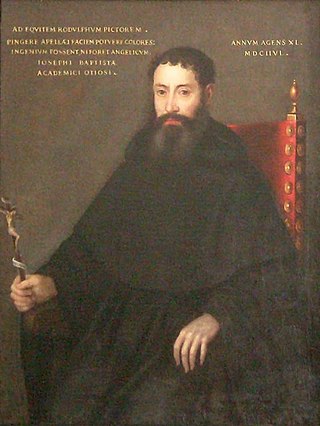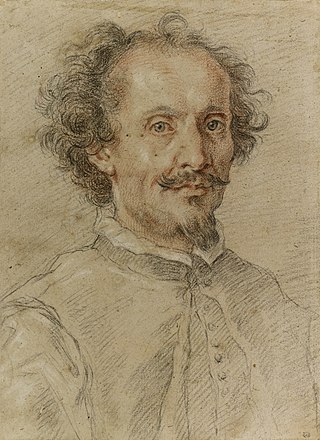
Agostino Carracci was an Italian painter, printmaker, tapestry designer, and art teacher. He was, together with his brother, Annibale Carracci, and cousin, Ludovico Carracci, one of the founders of the Accademia degli Incamminati in Bologna. Intended to devise alternatives to the Mannerist style favored in the preceding decades, this teaching academy helped propel painters of the School of Bologna to prominence.

Claudio Achillini was an Italian philosopher, theologian, mathematician, poet, and jurist. He is a major figure in the history of Italian Baroque poetry.

Sant'Anatolia di Narco is a comune (municipality) in the Province of Perugia in the Italian region Umbria, located about 60 km southeast of Perugia, in the middle Valnerina valley. It is a medieval town commanded by a 12th-century castle, with a 14th-century line of walls.

Baldassare Aloisi, or Baldassare Galanino, was an Italian history and portrait painter and engraver. He was also known as Il Galanino.

Giovanni Pietro Bellori, also known as Giovan Pietro Bellori or Gian Pietro Bellori, was an Italian art theorist, painter and antiquarian, who is best known for his work Lives of the Artists, considered the seventeenth-century equivalent to Vasari's Vite. His Vite de' Pittori, Scultori et Architetti Moderni, published in 1672, was influential in consolidating and promoting the theoretical case for classical idealism in art. As an art historical biographer, he favoured classicising artists rather than Baroque artists to the extent of omitting some of the key artistic figures of 17th-century art altogether.

The Simonetti family is an Italian noble family with origins in Tuscany. During the 12th century different branches in Florence, Terni, Lucca, Pistoia and Pescia developed. Other famous branches of this family were established in Jesi, Palermo, Milan and Bologna.
Giovanni Luigi Valesio, also known as Giovanni Valesio or Luigi Valesio, was an Italian painter and, most prominently, an engraver of the early-Baroque, active in his native city of Bologna, and then in Rome.

Giovanni Maria Verdizotti was a well-connected writer and artist who was born in Venice in about 1525 and died there in 1600.

The Archdiocese of Pescara-Penne is a Latin diocese of the Catholic Church on the east coast in central Italy.

The Diocese of Foligno is a Latin Church ecclesiastical territory or diocese of the Catholic Church in Umbria, Italy. It is a suffragan diocese in the ecclesiastical province of the metropolitan Archdiocese of Perugia-Città della Pieve.

Marco Barbo of Venice was a cousin and lifetime follower of Cardinal Pietro Barbo, who became Pope Paul II in 1464. Marco was appointed Bishop of Vicenza on 17 September 1464; appointed a cardinal of the Roman Catholic Church on 18 September 1467; and Patriarch of Aquileia in 1470. He was a principal papal administrator.
Alessandro Borgia was an Italian bishop and archbishop.

Francesco Mancini was an Italian painter whose works are known between 1719 and 1756. He was the pupil of Carlo Cignani.

Antonio Mongitore was a Sicilian presbyter, historian and writer, known for his works about the history of Sicily. He was also canon of the cathedral chapter of Palermo.

Camillo Tutini was an Italian historian, mainly of the Neapolitan region.

The Last Communion of Saint Jerome or The Communion of Saint Jerome is an oil on canvas painting by Italian painter Agostino Carracci, created c. 1592-1597. It was produced for San Girolamo alla Certosa church in Bologna and it is now held in the Pinacoteca Nazionale di Bologna.

Angelico Aprosio was an Italian Augustine monk, scholar, and bibliophile.

Agostino Mascardi was an Italian rhetorician, historian and poet.

Ludovico Settala was an Italian physician who lived during the Renaissance.

Michelangelo Torcigliani was an Italian Baroque poet from Lucca.

















